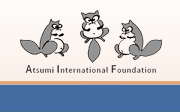SGRA Kawaraban (Essay) in English
John Chuan-Tiong Lim “The 5th Japan-Taiwan Asia Future Forum ―120 years’ Japan-Taiwan Exchange through Japan Study ―”
On May 8, 2015, the 5th Japan-Taiwan Asia Future Forum was held under the title “120 years’ Japan-Taiwan Exchange through Japan Study” at National Taiwan University.
When we look back at the Japan-Taiwan relations over the past 120 years, how shall we reconsider our past experience before the War and legacy of the past? What are the characteristics present in the process of the reconstruction of Japan-Taiwan relations which met a lot of difficulties? What keywords will be necessary when we view the next 120 years? Basing on such awareness of the issues, we had 13 lectures and paper presentations and also had lively discussions. Mr. Li Jia Jin, Chairman of the Association of East Asia Relations and Mr. Mikio Numata, Chairman of the Interchange Association, Japan addressed the Forum, which was a great success with more than 200 participants,
The forum was composed of three sessions: “international relations”, “study of languages and literatures” and “change of societies”. We invited scholars who are active at the forefront in Taiwan, Japan, Korea and China, and they developed hot discussions from their innovative viewpoints.
Keynote speech was made by Mr. Yasuhiro Matsuda, Professor of Institute for Advanced Studies on Asia, The University of Tokyo on the subject of “Japan-Taiwan exchange:characteristics and change of its ‘double structure”’. He mentioned first that the relations of the first 50 years were on a suzerain state and a colony system. He pointed out that the characteristics of “double structure” developed during the latter 70 years whereby two countries became independent of each other from a viewpoint of a manifestation of independence of Taiwan. The relations of Japan and Taiwan in the colonial period had such “double structure” as “the central government and the government-general” and “the society of Japan and Taiwan”. He emphasized that it changed after 1952, through several years of transition, to “double structure” of “Japan-China relations on the governmental authorities concerned” and “Japan-Taiwan relations between societies”. He ended his keynote speech with a question: how does the rise of China affect the Japan-Taiwan relations and it will be a key issue how the Taiwan people understand the independence of Taiwan.
The first session was held on the theme “Japan-Taiwan relations under the change of political circumstances and international relations” by adjunct Professor, Wu Mi Cha,Department of History, National Taiwan University, as Chairperson. We discussed about “120 years’ Japan-Taiwan relations” from three viewpoints; Taiwan, Japan and China. The following three essays were announced in the session: “From “Colonial Mother Country” to “International Relations” – Change in the Cultural Independence in Taiwan and Japan-Taiwan relations – “ by Mr. Li Cheng Ji, Assistant Professor, Department of Literature of Taiwan, National Cheng Kung University;
“Japan Study in Taiwan and Taiwan Study in Japan in the early days of the post War by Professor Makoto Kawashima, Graduate School of Arts and Sciences, the University of Tokyo; and“120 years’ Taiwan-Japan relations from the viewpoints of China” read for Wang Jian, Researcher of Institute of Modern History, Chinese Academy of Social Science.
Every essay was exciting and it was an epoch-making event for scholars and researchers of Japan, China and Taiwan to have convened in one place to discuss about “Japan-Taiwan relations”.
The theme of the second session was “Review and View of Japan Study – Language and Literature –“ and was divided into (A) “Literature / Culture” and (B) “Language / Study of Language”. Chairperson of the first session was Professor Fan Shu Wen, Head of Department of Japanese Literature in Japanese Language, National Taiwan University. Three essays were presented: “A Study of Japanese Modern Literature” by Huang Cui E, Assistant Professor, Department of Foreign Language, Fu Jen Catholic University; “A Study of Japanese Classical Literature in Taiwan – the past, the present and the future“: and “Japan Study in Taiwan – about its thought, culture and history –“ by Lan Hong Yuen, Assistant Professor, College of Humanities and Social Science, National Chiao Tung University. The session was very various. We studied Japanese literature from remote ages to modern ages by “an axis of time” and put our thoughts together by “an axis of field”.
In the (B) session “Language / Study of Language”, Professor Lin Li Ping, Department of Japanese Literature in Japanese Language, National Taiwan University, was the chairperson. Mr. Lai Jin Que, professor, Department of Japanese Literature and Head of Foreign Literature, Soochow University presented his report “Study of Learning Japanese Language in Taiwan on data”. Ye Shu Hua, Dean of Foreign Language, National Kaohsiung First University of Science and Technology, discussed “the present and the prospect of Study of Japanese language in Taiwan – at an international symposium –“(study of Japanese language and learning by Japanese language by use of a keyword, data and symposium). Professor Shin Chung Kyun, Department of Japanese language and Japanese literature, Chunbuk National University (Korea) made an interesting report under the title “History of the study of Japanese language in Korea –Study of old time Japan in Chosun (old Korea) time and now- “
The third session, “The change of societies in Japan and Taiwan and an aspect of their exchanges”, focused on “the change of societies” and “an aspect of cultural exchange” in the history of Japan-Taiwan exchanges. Three essays were reported under Chairperson, Mr. Zhang Qi Xiong, Associate Research Fellow, Institute of Modern History, Academia Sinica.
Mr. Yukihito Sato, Ph.D. Institute of Developing Economics – JETRO, clarified the dynamism of reproduction of cooperative relationship among enterprises of both countries from economics viewpoints under the title “Reproduction of trust and cooperation among enterprises in Japan and Taiwan” referring to several examples.
Mr. Zhong Shu Min, Assistant Researcher, Institute of Taiwan History, Academia Sinica, from a viewpoint of identity, reported his reconsideration of an exchange between a Japanese who was born in Taiwan and Taiwan society under an interesting title “Foreign land where I took root becomes my homeland”.
Mr. Wu Rui Ren, Assistant Researcher, Institute of Taiwan History, Academia Sinica, analyzed, from a viewpoint of historical sociology, a phenomenon of linkage of right-wing nationalists of Japan and Taiwan by means of manipulation of historical ideology of realists.
The theme of the last general discussion was “A view on Japan-Taiwan relations of 21st Century”. Under chairperson, Professor Xu Xing-ging, Department of Japanese Literature and Chief of Japan Center, National Taiwan University, six scholars, Fan Shu Wen, Masashi Tujimoto, Yasuhiro Matuda, Makoto Kawashima, Wu Rui Ren and myself who represent each fields, attended. Each of us spoke about our Japan-Taiwan relations and the way of Japan studies during this 120 years first and indicated a direction hereafter.
Starting from Professor Yasuhiro Matsuda who rated this forum as “High level”, many participants also rated this forum high.
I hope our discussion this time will contribute to build a new “Japan-Taiwan relations”.
As to the result of survey, please refer to
http://www.aisf.or.jp/sgra/wp-content/uploads/2015/06/taiwan2015anketo.pdf
As to photos of the forum, please refer to
http://www.aisf.or.jp/sgra/photo-gallerly/2015/3236/
(Adjunct Professor, National Taiwan University)
Translated by Kazuo Kawamura
English checked by Mac Maquito






